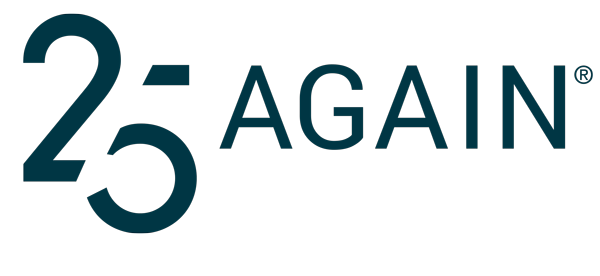If you have ever thought about hormone therapy, then there are probably a couple of important questions on your mind. Every week, thousands of our current members, new patients, and our staff ask and answer questions about hormone therapy. Oftentimes, these questions come from people who are hearing about a friend or family member who recently started a 25 Again program or took one our health Assessments.
Because we hear many of the same things on a regular basis, we want to make it easier for others to find answers to common questions about hormone therapy. Hormones are not something most people have had time to study in school or on their own. Even if they have, it’s frightening to hear about a lot of misinformation or flat out bad information floating around regarding this growing segment of the healthcare industry.
Hormones are understudied by the average person. What’s more, even the above-average medical professional likely has not studied the dramatic benefits of a medically supervised, safe and effective hormone therapy plan like the one at 25 Again. Here are 4 of the most common questions we answer regarding hormone therapy.
Question 1: Does it really work?
This requires a simple and affirmative answer of “Yes, definitely!” But we always tell people they don’t have to take our word for it. We have thousands of members becoming healthier every day who testify on our behalf. Many of them can be seen in videos on our official Youtube channel and Facebook page.
Our medical experts have personally met with men and women of all ages who increased their energy; lost 50, 100 or more pounds; regained testosterone levels that started below 100 (or less in many cases) before surging back to the healthy amounts experienced by 20 and 30 year olds; and literally fought off disease with our help. These claims are documented and supported by consistent, easy-to-read reports that show real levels of biomarkers in the body. We take the guesswork out of the equation for our members. All improvements are recorded and tracked so you have a very clear picture of progress.
Question 2: How long do I have to do it?
Let’s say you are a former high school or college athlete but you haven’t worked out in years, maybe decades. One day you start a regular workout routine. You ease into it by stretching regularly, focusing on core strength and small goals as you advance. After a few weeks, you feel better. After 2 months your friends notice big differences. You are now able to train harder and begin feeling and looking more athletic. After a year you appear fitter and stronger. Your confidence booms. You begin seeing someone who becomes a significant other and your life feels perfect. Would you call this a cure to your problems and then quit your exercise routine? What would happen if you did?
Certainly, some people in the example above would be content with sliding back to their previous lifestyle, weight, condition, etc. But those people wouldn’t proclaim, ‘That exercise routine was a scam because I gained all these muscles and they disappeared after I stopped using them.’
Hormones aren’t exactly the same as muscles, but we use this example to explain expectations. Similar to increases in cardiovascular and musculoskeletal systems, improvements in hormones have dramatic effects on your body, mind, overall health, and even happiness. But if you stop doing a program designed to optimize your muscles or your hormones, these benefits are going to decrease over time. And just like a runner who goes from being able to pound out a mile in under 6 minutes to someone who plods along at a 10-12 minute pace after a year of inactivity, a person who experiences the benefits of hormone optimization will miss them if they slide back to less rigorous activity levels.
What Are Your Priorities?
Here’s another example of how the changes. A recent article in the New York Times discussed the frightening trend occurring among contestants on a popular TV Show featuring adults who challenge themselves to lose enormous amounts of weight. All but one of the contestants have regained most or all of the weight and continue to suffer health consequences in the years following the show. This might sound discouraging at first, but an important takeaway mentioned in the article (which cites a larger academic study) shows that hormones play a very important role in the yo-yo effect.
To sum it up, diet and exercise are important in your journey to the accomplishment of ideal weight and health goals but hormones play an even more critical part than you might know. Leptin is mentioned several times in the article but it is also just one of the many hormones involved in hunger/weight processes within the human body. When hormones are out of balance it can cause an onslaught of physiological and psychological problems. The article cites a few potential issues that some of the most driven and successful health-conscious adults faced later in life including overwhelming cravings and black-out hunger binges. What’s scariest of all is that these intensify during and after weight loss.
Is it a priority for you to avoid these problems in your journey? Let me put it another way. After you have provided the basic necessities for your family and yourself, your future depends entirely on how well you maintain your body. There are no trade-in deals, or upgrades to new models down the line when it comes to your body. Is it a priority for you to keep your body functioning properly and at it’s optimal best in order to be there for your family later in life?
Question 3: Yeah but when am I cured?
This third question is difficult to answer for many reasons. It is also perfectly understandable that people think about hormones as something that can be ‘cured’ because current health systems train us to think about changes in the body as something that can be overcome. We often hear people refer to a term called ‘A pill for every ill.’ This phrase calls to attention that we want an easy solution that can be started and stopped to help us feel like our normal selves again.
But when it comes to the aging process, there is not usually a single cure for many short or long-term health problems plaguing adults. But there are certainly steps that can be taken to rebuild the body’s natural defenses, fight off disease-causing inflammation, and enjoy the optimal health we experienced in our 20s and 30s. Such steps lead people in many directions, some more effective than others depending on your goals.
Losing weight is a great goal with countless benefits. Similarly, tightening your skin, reducing wrinkles, gaining muscle, and increasing energy are all wonderful achievements. These are all signs of aging that can slowed down, reduced, or even reversed. But once people stop a treatment plan, the general effects of time begin to take hold of the body once again. The 25 Again program is definitely helping thousands of people regain their health and physique. Once these items start to improve, it’s important to remember the real question that you should be asking…
Question 4: How do hormones help me live a longer, healthier, and happier life?
In general, studies show how hormones reduce inflammation in the body, strengthen the immune system, boost cognitive ability, combat cardiovascular disease, and even fight back against certain types of cancer. But the best answer to this question is based more on personal and individual risk factors and health history. Our medical providers take time to get to know patients. They want to learn about your background, symptoms, and lifestyle needs.
Make sure to ask questions like this during your next appointment. Short-term concerns are important but the long-term benefits of hormone optimization are literally life-changing. Sometimes, these can even be life-saving! Remember, there are no dumb questions. We are here to help!

